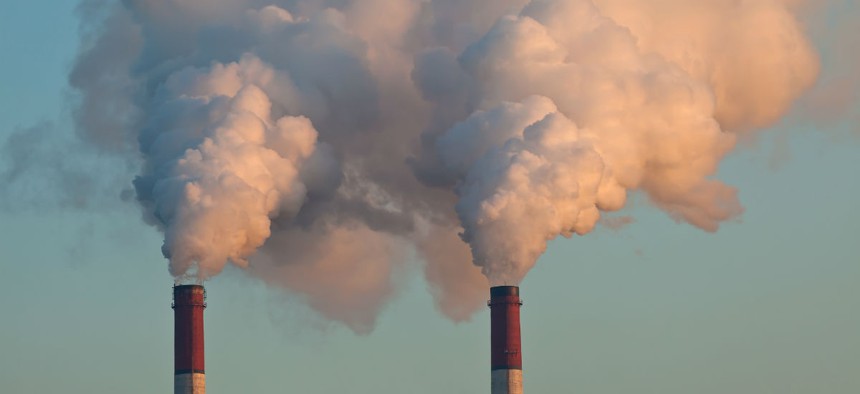
Drop of Light / Shutterstock.com
Federal Court Rejects Attempt to Block EPA Climate Rules
Panel says the challenge against EPA came too early.
In a major victory for the Obama administration, a panel of federal judges has blocked a challenge to the Environmental Protection Agency's planned efforts to limit carbon-dioxide emissions from power plants.
Tuesday's ruling does not prevent future legal challenges against the rules but states that a challenge before the U.S. Court of Appeals for the D.C. Circuit came too early, as EPA has not yet finalized its climate rule. That action is expected later this summer.
The case, brought by coal company Murray Energy and a coalition of states led by West Virginia, was an early skirmish in the high-stakes legal battle over the rules, which stand as the centerpiece of President Obama's second-term climate-change agenda.
It was highly unusual in that it attempted to challenge the legality of a federal rule before it had been made final. At least two of the judges on the three-judge federal panel appeared hesitant during oral arguments in April to side with state and industry challengers, suggesting that such a move would break with long-held precedent and open the floodgates to future legal challenges against not-yet-final rules.
"Petitioners are champing at the bit to challenge EPA's anticipated rule restricting carbon-dioxide emissions from existing power plants. But EPA has not yet issued a final rule. It has issued only a proposed rule," stated Judge Brett Kavanaugh, writing for the majority of the three-judge panel. "They want us to do something that they candidly acknowledge we have never done before: review the legality of a proposed rule. But a proposed rule is just a proposal."
Tuesday's decision does not mean, however, that the rule is safe from future legal attacks. The legal opinion did not delve into the wide array of arguments that opponents have marshaled in support of their effort to dismantle the regulation, leaving an opening for an all-but-guaranteed onslaught of lawsuits sure to arrive once the rule is made final.
Nevertheless, the ruling arrives as a key victory for the administration.
"EPA is pleased that the court has denied the challenges to our proposed Clean Power Plan and confirmed our assessment that they are premature," Liz Purchia, a spokesperson for the agency, said. "The Clean Power Plan is built on a time-tested state-federal partnership established by Congress decades ago in the Clean Air Act that gives states important flexibility to design plans that meet their individual and unique needs."
Environmentalists were also quick to applaud. "Today's decision by the U.S. Court of Appeals is both a big win in protecting our communities and families against the massive carbon pollution from power plants and an important victory for a fair and democratic rule-making process," Vickie Patton, the general counsel for the Environmental Defense Fund, said.
The decision delivers a blow to Republican opponents of the regulation who had hoped that the panel of conservative judges would rule in their favor.
Republicans led by Senate Majority Leader Mitch McConnell have vowed to fight the regulations tooth and nail, accusing the administration of attempting to wage a war on coal by pushing the regulatory regime forward.
McConnell has urged states not to comply with the rule and vowed to do everything in his power to fight back. But lacking the necessary votes to override a presidential veto, McConnell's bid to sink the rule looks more likely to succeed in the courts than in Congress.
The case gained notoriety with the participation of legal scholar Laurence Tribe, a longtime mentor to President Obama, who argued on behalf of Peabody Energy against the administration.
Obama's plan would "upturn the entire constitutional system" and force states to become "puppets of a federal ventriloquist" that would be "brought into the federal army," Tribe told the three-judge panel during oral arguments in April.
Tribe argued that the regulation should not be allowed to take effect on the grounds that it is unconstitutional. Opponents of the rule have also argued that EPA's plan to regulate carbon dioxide from power plants is not legal given that the agency is already regulating toxic air pollution from power plants.
"Although the administration dodged a bullet, it can't really claim the case as a big victory. The court did not say anything about the legal merits of the Clean Power Plan. All those issues are simply put off to another day," said Jeff Holmstead, a partner with the law firm Bracewell and Giuliani and a former Bush administration EPA official.
(Image via Drop of Light/Shutterstock.com)






